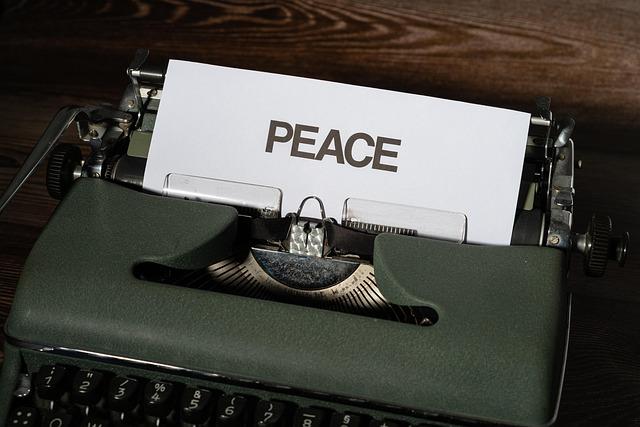introduction:
In recent years, egypt has emerged as a focal point in the global dialog surrounding human rights, attracting scrutiny from international organizations, notably Amnesty International.the country,often lauded for its rich cultural heritage and historical importance,has faced serious challenges in upholding the rights of its citizens. Reports from Amnesty International highlight a worrying trend marked by widespread repression, including restrictions on freedom of expression, assembly, and association.As Egypt grapples with political instability and social unrest,the implications for human rights remain profound,prompting a critical examination of the government’s policies and the lived experiences of individuals within its borders. This article delves into the current human rights landscape in Egypt, as reported by Amnesty International, shedding light on key issues and the ongoing pursuit of justice and accountability in a country at a crossroads.
Human Rights Violations in Egypt: An Ongoing Crisis
The situation in Egypt regarding human rights remains dire,with numerous reports highlighting systematic abuses and ongoing repression by the authorities. Key areas of concern include:
- Arbitrary Detention: Thousands of individuals, including activists, journalists, and dissenters, face detention without trial, often under vague charges.
- Torture and Mistreatment: There are credible allegations of torture in custody, where detainees endure physical and psychological abuse.
- restrictions on Freedom of Expression: The government imposes severe restrictions on media and civil society, leading to self-censorship and the intimidation of dissenting voices.
Moreover, the Egyptian government’s crackdown on peaceful assemblies raises alarms about the future of civic freedoms. Recent years have seen a rise in enforced disappearances, where individuals vanish without trace, only to resurface in security facilities, often under dire conditions.The violations extend to:
- Suppression of Assembly Rights: Protests are met with violence,leading to excessive use of force by security apparatus.
- LGBTQ+ Rights Violations: Members of the LGBTQ+ community face harassment and violence, with laws being exploited to justify arrests based on sexual orientation.
- Judicial Harassment: Political opponents are frequently subjected to unfair trials, highlighting the judiciary’s complicity in human rights abuses.

Freedom of Expression: the Struggle for Dissent
The right to voice dissent and express differing opinions is a cornerstone of any society that cherishes democracy and justice. However, in Egypt, this fundamental principle faces substantial challenges. Activists, journalists, and ordinary citizens have found themselves increasingly silenced by a regime that sees dissent as a threat. Reports indicate that a vast array of tactics are employed to stifle free expression, including but not limited to:
- Arbitrary detention: Individuals are imprisoned without fair trial, often for merely expressing their views online or in public.
- Intimidation of media: Journalists report harassment and coercive measures that prevent them from covering sensitive topics.
- Internet censorship: Websites and social media platforms are blocked to suppress access to data and alternative narratives.
This habitat of repression creates a chilling effect on freedom of speech, where fear of repercussions stifles meaningful debate and activism. As the global community increasingly calls for the recognition of human rights, the situation in Egypt reveals a dire need for international attention and actions aimed at protecting those who dare to speak out.A recent survey highlighted the systemic issues faced by dissenters:
| Issue | Percentage of Respondents Affected |
|---|---|
| Fear of retaliation | 78% |
| Self-Censorship | 65% |
| Inaccessibility of Information | 54% |
These statistics underscore a profound crisis in the realm of civil liberties in Egypt, where the ongoing struggle for the right to dissent continues to face formidable hurdles. It is indeed crucial that the drive for human rights activism gains momentum, shining a light on these injustices and fostering a more open dialogue that encourages diverse perspectives.

Arbitrary detentions: A Systematic Approach to Suppression
The Egyptian government has increasingly resorted to arbitrary detentions as a method of quelling dissent and maintaining control over civil society. These detentions are often characterized by their lack of openness and legal justification,with many individuals imprisoned under vague charges that relate to national security or anti-terrorism. Such practices not only violate fundamental rights but also instill fear among the populace, discouraging activism and the freedom of expression. victims of arbitrary detention frequently report instances of ill-treatment, solitary confinement, and denial of due process, which further highlights the extent of the systemic abuse of authority within the state’s security apparatus.
In its quest to stifle opposition, the regime has developed a complex network to facilitate these widespread detentions. Key tactics include:
- Preemptive arrests: Targeting individuals before potential protests or public gatherings.
- Monitoring and surveillance: Utilizing technology to track dissenting voices on social media and in local communities.
- Legal loopholes: Exploiting ambiguous laws to justify detentions without providing tangible evidence.
These tactics reveal a deliberate strategy to suppress civil liberties and silence any form of dissent, effectively creating a culture of fear in which individuals are reluctant to express their opinions or challenge the status quo. The implications for human rights are profound, as the line between legitimate governance and oppressive control continues to blur.

The Plight of Women and Minority Rights: A Call for Action
The situation for women and minority groups in Egypt continues to deteriorate, marked by systemic discrimination, social stigmas, and legal barriers that restrict their full participation in society.Women face numerous challenges, including gender-based violence, inadequate legal protections, and limited access to healthcare and education. Reports indicate that over 30% of women have experienced some form of violence, yet only a fraction of these cases are reported, often due to fears of social repercussions or lack of faith in law enforcement. For minorities, especially the LGBTQ+ community and religious minorities, the atmosphere is equally oppressive, with laws that criminalize their identities and lifestyles, leaving them vulnerable to harassment, abuse, and exclusion from fundamental human rights and freedoms.
Immediate action is essential to address these violations and uphold the dignity of all individuals. Activists and organizations must unite to advocate for changes in legislation that will protect the rights of women and minority groups, ensuring equality and justice under the law. Potential focuses for advocacy could include:
- Legal Reforms: Enforcing and implementing laws against gender-based violence and discrimination.
- Awareness Campaigns: Educating the public to challenge stigmas and misconceptions surrounding women and minority rights.
- Support Services: Establishing shelters and support networks for victims of violence and discrimination.
- Inclusive Policy Making: Ensuring that the voices of women and minorities are represented in political processes.
These steps can pave the way for a more inclusive society, fostering an environment where every individual can thrive nonetheless of their gender or background.

Recommendations for International Engagement and Accountability
To promote and safeguard human rights in Egypt, it is indeed crucial for the international community to enhance diplomatic engagement and impose systematic accountability measures. Governments and organizations should:
- Advocate for legal reforms that ensure alignment with international human rights standards.
- Support civil society initiatives,empowering local organizations that work towards promoting human rights.
- Utilize diplomatic leverage by linking developmental aid and trade agreements to human rights improvements.
- Encourage monitoring by independent bodies to assess the state of human rights and report findings transparently.
Furthermore, maintaining a consistent dialogue on human rights issues is essential. Effective measures include:
- Establishing regular reporting mechanisms that evaluate Egypt’s compliance with international human rights treaties.
- Creating an international coalition that holds the Egyptian government accountable for human rights violations.
- Organizing forums for international leaders to address ongoing abuses and engage with Egyptian authorities constructively.
- Promoting cultural diplomacy to encourage individual freedoms through shared values and knowledge exchange.

The Role of Civil Society in Promoting Human Rights Reforms
in Egypt, civil society plays a pivotal role in advocating for human rights reforms, often serving as the voice for marginalized communities and those oppressed by systemic injustice. these organizations and grassroots movements work tirelessly to raise awareness, mobilize citizens, and lobby the government for changes that enhance accountability. They focus on a variety of critical issues including freedom of expression, gender equality, and protection of minority rights, striving to create a more just society. Through campaigns, legal aid, and education initiatives, civil society groups shine a spotlight on violations and leverage public sentiment to pressure authorities into adopting necessary reforms.
Moreover, the engagement of civil society in monitoring human rights abuses is indispensable in the context of international scrutiny. They document instances of oppression and provide credible reports that bolster the arguments for change. This not only influences domestic policy but also attracts the attention of international bodies. Some key initiatives include:
- Documenting Violations: collecting data on human rights abuses for reporting.
- Advocacy Campaigns: Organizing campaigns to raise awareness and spark dialogue.
- Capacity Building: Training legal professionals and activists to navigate legal frameworks.
The collaborative efforts of various civil society actors amplify their impact, fostering a culture of accountability. The challenges they face are meaningful, including government pushback and restrictions on their operations, yet their resilience continues to inspire progress in human rights reforms across the nation.

to sum up
the landscape of human rights in Egypt remains a complex and challenging arena, characterized by significant strides alongside persistent violations. As highlighted by Amnesty International’s continuous monitoring and reporting, the Egyptian government faces growing scrutiny over its treatment of dissent, freedom of expression, and the rights of marginalized groups.The international community’s response, through advocacy and pressure, plays a crucial role in shaping the future of human rights in the country. While the path to progress may be fraught with obstacles, it is clear that the resilience of civil society and the unwavering call for justice from activists and organizations like Amnesty International are vital in the quest for a more equitable and just Egypt. As we look ahead, it is imperative to remain vigilant and engaged, understanding that the protection of human rights is not only a local concern but a global imperative.







